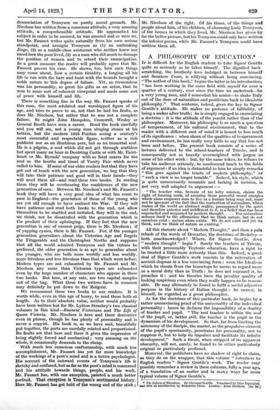A PHILOSOPHY OF EDUCATION.*
IT is difficult for the English student to take Signor Gentile quite so seriously as he takes himself. The dignified back scratching, the brotherly love indulged in between himself and Senatore Croce, is edifying without being convincing. The author of this book," begins the latter in his introduction, " has been working in the same field with myself for over a quarter of a century, ever since the time we undertook—he a very young man, and I somewhat his senior—to shake Italy out of the doze of naturalism and positivism back to ideaastie philosophy." That sentence, indeed, gives the key to Signor Gentile's attitude. He makes no pretence of fallibility, of being a seeker after truth; he is simply engaged in enunciating a doctrine : it is the attitude of the pundit rather than of the philosopher. Moreover, his philosophy is so much a question of temperament, of his cultural environment, that to the reader with a different cast of mind it is bound to lose much of its significance : when shorn of the qualities of temperament and environment, he has really very little to say that has not been said before. The present book consists of a series of lectures delivered to the school-teachers of Trieste, and is consequently not so heavily overweighted with jargon as some of his other work : but, by the same token, he refuses to take his audience seriously, to condescend much to the fields of argument: if an idea is distasteful to him he simply remarks " this goes against the tenets of modern philosophy," or " such a view is no longer tenable." Indeed, his style, which is quite unnecessarily romantic and lacking in incision, is not very well adapted to argument :-
" The teacher who, because of his lofty mission, claims the right of forming souls, of arousing those powerful moral energies which alone empower man to live as a human being may not, must not be ignorant of the fact that the contention of naturalism, which makes of the world an abstract reality, presupposed by the spirit and therefore anterior and indifferent to it, is,a belief that has been superseded and surpassed by modem thought. . . . For naturalism reduces itself to the affirmation that we think nature, but do not ourselves exist : nature alone exists. We do not exist and yet we think, and we think of nature as existing."
All this rhetoric about "Modern Thought," and then a pale rehash of the words of Descartes, the doctrines of Berkeley—
both unacknowledged Where, for Signor Gentile, does " modern thought " begin ? Surely the teachers of Trieste, with their presumably Teutonic education, have a right to be treated a little more seriously than this. Indeed, a great deal of Signor Gentile's work consists in the reiteration of ancient dogmas in a less convincing form : even the Idealism which he shouts from the housetops he seems to regard more as a moral duty than as Truth : he does not expound it, he preaches it : and his theories have the peculiar quality of looking suspicious even when they really happen to be reason- able. He may ultimately be found to fulfil a useful adjustivo purpose in the history of Italian thought : he cannot, in himself, be regarded as a great philosopher.
As for the doctrines of this particular book, he begins by a rather unconvincing proof of the universality of the individual personality : hence he deduces the impossibility of a duality of teacher and pupil. " The real teacher is within the soul of the pupil, or, better still, the teacher is the pupil in the dynamism of his development. So that, far from limiting the autonomy of the disciple, the master, as the propulsive element of the pupil's spontaneity, penetrates his personality, not to suppress it, but to help its impulses and facilitate its infinite development." Such a thesis, when stripped of its apparent obscurity, will not, surely, be found to be either particularly original or particularly profound.
Moreover, the publishers have no shadow of right to claim, as they do on the wrapper, that this volume " introduces to English readers " Signor Gentile's work. The reader may possibly remember a review in these columns, fully a year ago, of a translation of an earlier and in many ways far more
typical volume of Signor Gentile's.
• The Reform of Education. By Giovanni Gentile. Translated by Dino Blgongiari and with an Introduction by Benedetto Croce. London Bean Brothers. 1811. Cod.i










































 Previous page
Previous page